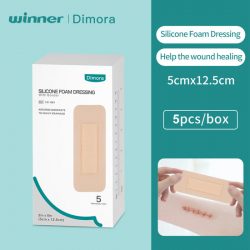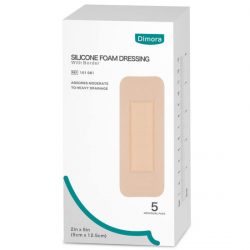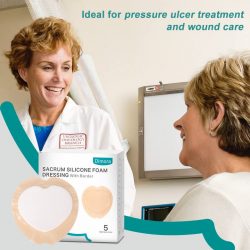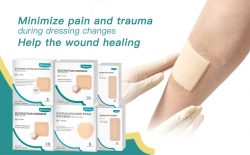What is Foam Dressing?
Foam dressing is a medical polyurethane material with a texture similar to “sponge”, which can be used in conjunction with ointments and other dressings. It is an outer dressing used to replace gauze. Foam dressing is a medical consumable, not a drug, and can only be purchased in hospitals. It can also be purchased from pharmacies or online stores that have a license to sell medical devices.
1. Types of wounds suitable for foam dressing
(1) Burns and trauma wounds with more exudation in the early stage.
(2) Wounds that are prone to pressure, such as pressure ulcers on the sacrococcygeal region and pressure ulcers on the heel; wounds that are not easy to bandage, such as the sacrococcygeal region, joint parts, and head; wounds in the later stage after the formation of granulation tissue.
2. Types of wounds that are not suitable for foam dressing alone
Infected wounds with thick secretions need to use anti-infective ointment; deep wounds with strong necrotic tissue adhesion need to use scab-removing ointment; sinus tract and cavity wounds need to be packed.
3. The advantages of foam dressing
(1) The foam silicone absorbent dressing has a soft texture, adheres to the wound surface, and flattens the raised granulation tissue more efficiently; the polymer material does not stimulate granulation proliferation.
(2) It absorbs exudate quickly and in a large amount, which can dehydrate the granulation tissue; the inner layer has a hydrocolloid coating, which is not easy to adhere to the wound surface.
(3) There is a moisturizing film on the outer layer to maintain a moist healing environment; there is a hypoallergenic film around it to better fix the dressing.
(4) Use a fully enclosed foam dressing to protect the wound during bathing.
4. How to use foam dressing
Foam silicone absorbent dressing can be used independently without any drugs, or it can be combined with other drugs to play a better anti-infection or moisturizing effect. The specific method is as follows:
(1) Disinfect the wound surface first, and then spray the growth factor.
(2) Apply the ointment to the inner layer of the foam dressing, and then cover the wound with the foam silicone absorbent dressing. If necessary, the outer layer can be fixed with adhesive tape or pressure bandage.
(3) Foam dressing can effectively prevent pressure injury, meets the requirements of the guidelines, and can be used in high-risk parts such as the sacrococcygeal region, heel region, and posterior occipital region to reduce the incidence of pressure ulcers in surgical patients.
Foam dressing is a new type of functional dressing that has been widely used in clinical practice since the 1970s, and is often used for wound management. Foam dressing has good air permeability, good hygroscopicity and anti-infection properties. It can absorb wound exudate and reduce wound secretion; it can form a moist environment on the wound surface, reduce the adhesion of dressings and wound granulation tissue, which is conducive to tissue proliferation and wound repair; it can clean and keep the skin in the pressure part. External pollution can protect the exposed nerve endings on the wound surface and relieve pain; the foam dressing is moderate in hardness and softness, which can effectively relieve the pressure on the wound surface and reduce the incidence of bedsores in bedridden patients.




































